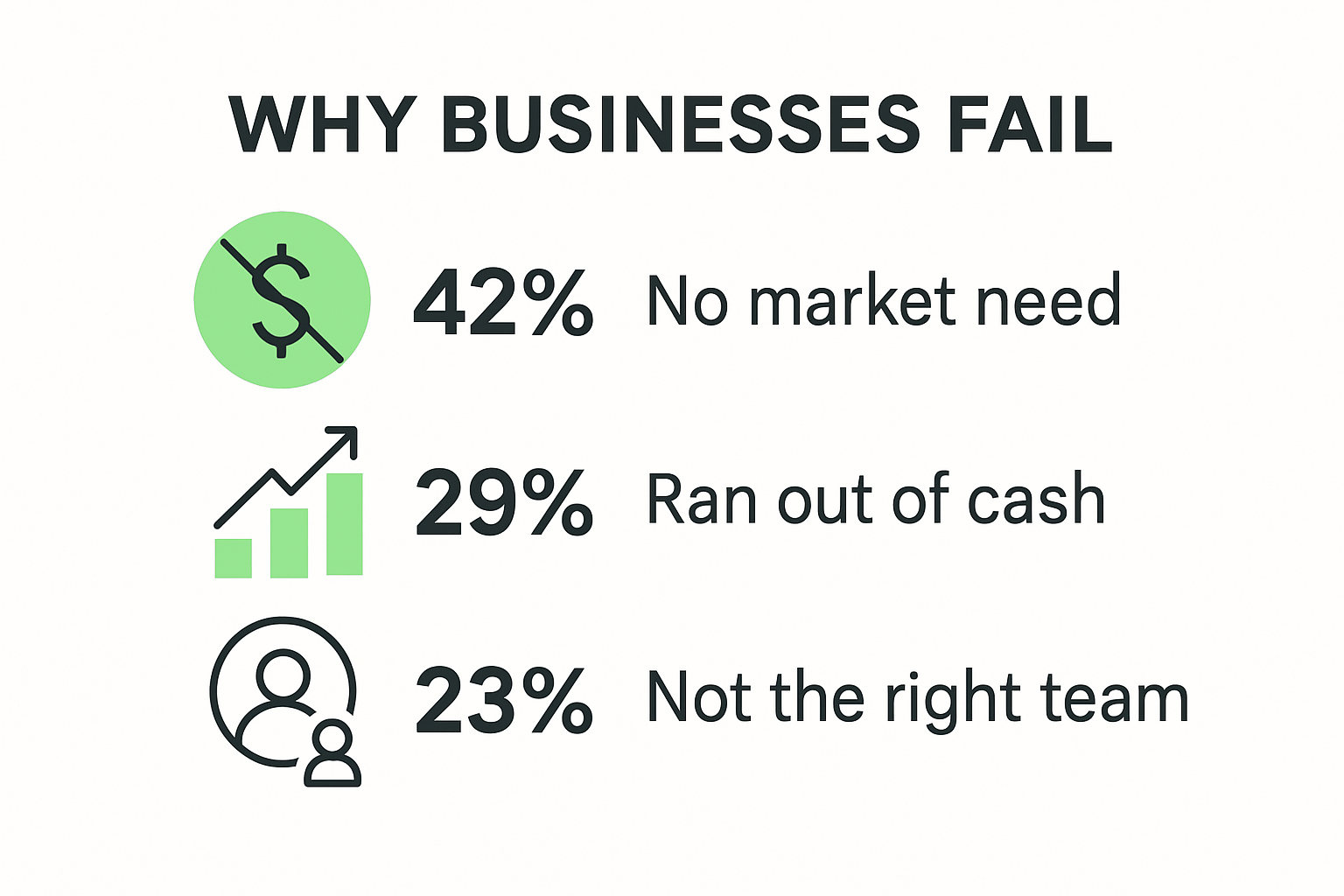
Top Reasons Businesses Fail in 2025: A Guide for New Founders
Startup fever is blazing hotter than ever in 2025 and founders everywhere are chasing the next big idea. But pause for a second. Did you know that 42 percent of startups fail just because they badly misread what the market really wants? That seems backward when you consider how easy it looks from the outside. The real shock is most businesses crash not because of bad timing or weak products, but from a simple lack of listening and planning where it matters most.
Table of Contents
- Misunderstanding Customer Needs And Market Demand
- The Fatal Disconnect Between Vision And Market Reality
- Avoiding The Customer Blind Spot
- Practical Strategies For Market Alignment
- Weak Business Planning And Money Management
- The Financial Foundation Of Business Success
- Navigating The Cash Flow Minefield
- Building Financial Intelligence
- Lack Of Marketing And Online Presence
- The Digital Visibility Challenge
- Crafting A Compelling Digital Strategy
- Beyond Vanity Metrics
- Overcoming Failure: Actionable Steps For New Entrepreneurs
- Embracing A Growth Mindset
- Strategic Reconstruction After Setbacks
- Building Resilience Through Continuous Learning
Quick Summary

Misunderstanding Customer Needs and Market Demand
Startup founders often believe their brilliant idea is automatically marketable. Reality tells a different story. Understanding customer needs is not just a recommendation it's a survival strategy for businesses in 2025.
The Fatal Disconnect Between Vision and Market Reality
Most entrepreneurs fall into the trap of creating solutions nobody actually wants. According to research from Forbes, approximately 42% of startup failures stem directly from misreading market demand. This isn't just a statistical quirk it's a systematic problem rooted in founders' overconfidence.
A small business's greatest potential advantage is providing specialized customer attention. Business fundamentals research reveals that many entrepreneurs fail to anticipate customer needs or track evolving market dynamics. They become so enamored with their product that they forget the most critical question: Will customers actually pay for this?
Avoiding the Customer Blind Spot
Successful businesses don't just create products they solve genuine problems. This requires deep market research, continuous customer feedback, and radical willingness to pivot. Founders must develop an almost obsessive commitment to understanding their target audience's pain points.
Ignoring customer needs is more than a strategic error it's a path to inevitable business failure. Small business management research consistently highlights managerial inadequacy in customer understanding as a primary reason businesses collapse.
Practical Strategies for Market Alignment
To clearly summarize the actionable strategies for staying aligned with customer needs and market demand, see the table below:
Remember: A poorly visualized business plan leads to operational nightmares. Investment experts consistently warn that misunderstanding market demand is tantamount to business suicide.
The market doesn't care about your passion. It cares about solutions that make life easier, cheaper, or more enjoyable. Founders who internalize this truth are the ones who survive and thrive.
Weak Business Planning and Money Management

Financial mismanagement is the silent killer of entrepreneurial dreams. Many founders believe passion and hard work are enough to sustain a business. The harsh reality reveals a different narrative where strategic financial planning determines survival.
The Financial Foundation of Business Success
Investopedia research reveals that ineffective business planning is a primary catalyst for small business failures. A robust business plan isn't just a document it's a roadmap that requires comprehensive analysis of critical elements including capital needs, cash flow projections, marketing strategies, and competitive landscape.
The U.S. Chamber of Commerce emphasizes that financial challenges represent the most critical threat to entrepreneurial ventures. Limited funding and poor budgeting skills can transform a promising startup into a cautionary tale faster than most founders anticipate.
Navigating the Cash Flow Minefield
Running out of capital is not just a possibility it's a probable outcome for unprepared entrepreneurs. University of Georgia's Small Business Development Center recommends founders maintain 1-2 years of operating capital as a financial safety net. This strategy requires meticulous planning and a realistic understanding of potential expenses.
Successful money management involves more than tracking income and expenses. It demands:
- Strategic Budgeting: Create detailed financial projections with conservative estimates.
- Emergency Fund: Always maintain a financial buffer for unexpected challenges.
- Expense Tracking: Monitor every dollar spent with ruthless precision.
Founders must recognize that financial management is a skill that can be learned. Those who invest time in understanding financial fundamentals dramatically increase their chances of long-term success.
Building Financial Intelligence
To provide a clear overview of essential money management practices highlighted above, the following table summarizes core actions for financial stability:
Financial literacy separates successful entrepreneurs from those who struggle. This means understanding not just numbers, but the story behind those numbers. Founders need to develop skills in reading financial statements, understanding cash flow dynamics, and making data-driven decisions.
The most resilient businesses are not built on luck but on a foundation of strategic financial planning. Entrepreneurs who treat their finances with the same creativity and passion they apply to their product are the ones most likely to thrive in the competitive business landscape of 2025.
Lack of Marketing and Online Presence
In the digital age, invisibility is equivalent to business death. Many entrepreneurs mistakenly believe that creating an excellent product automatically guarantees customer attention. The reality is far more complex and competitive.
The Digital Visibility Challenge
Lightspeed research reveals that an ineffective online presence represents a significant obstacle for small businesses. A user-friendly website optimized for mobile devices is no longer optional it's a fundamental requirement for survival. Investopedia's analysis emphasizes the critical nature of establishing realistic marketing budgets and understanding target audience reach. Entrepreneurs must develop strategic marketing initiatives that go beyond simple social media posts or sporadic advertising.
Crafting a Compelling Digital Strategy
Successful marketing in 2025 demands a multifaceted approach. Businesses need to:
- Build Authentic Connections: Create content that resonates with your target audience's genuine needs and pain points.
- Leverage Multiple Channels: Develop a presence across various digital platforms, from LinkedIn to Instagram, tailored to your specific audience.
- Measure and Adapt: Use analytics to track marketing performance and continuously refine your approach.
Wikipedia's research on business failures highlights that insufficient marketing and inability to compete can quickly lead to business collapse. Public interest is not automatic it must be actively cultivated.
Beyond Vanity Metrics
Marketing is not about generating likes or followers. It's about creating meaningful engagement that translates into tangible business results. Founders must view their online presence as a dynamic conversation with potential customers, not a static billboard.
The most successful businesses understand that marketing is an ongoing process of listening, learning, and adapting. They treat their digital strategy as a living organism that requires constant nurturing and strategic refinement.
In the crowded digital marketplace of 2025, your marketing strategy is not just a tool for growth it's your primary mechanism for survival. Businesses that fail to establish a strong, authentic online presence are essentially writing their own obituary before they've even truly begun.
Overcoming Failure: Actionable Steps for New Entrepreneurs
Failure is not the end of your entrepreneurial journey it's a critical learning opportunity. Many successful founders view setbacks as essential stepping stones toward eventual success. Understanding how to navigate and transform failure becomes a fundamental skill for any aspiring entrepreneur.
Embracing a Growth Mindset
Entrepreneurial resilience starts with reframing failure as feedback. When businesses encounter challenges, the most successful founders don't retreat they analyze, adapt, and advance. Viewing setbacks as data points rather than definitive judgments allows entrepreneurs to extract valuable insights that can fuel future strategies.
The U.S. Small Business Administration highlights the importance of rigorous market research and competitive analysis in preventing business failure. Their guidance emphasizes that ongoing learning and adaptation are not just recommended they are essential for survival.
Strategic Reconstruction After Setbacks
Rebounding from failure requires a systematic approach. Entrepreneurs must:
- Conduct Honest Self Assessment: Critically examine what went wrong without emotional defensiveness.
- Seek External Perspectives: Gather feedback from mentors, customers, and industry experts.
- Develop Actionable Pivot Strategies: Create concrete plans to address identified weaknesses.
Successful entrepreneurs understand that failure is rarely about a single catastrophic mistake. More often, it's the result of multiple small missteps compounded over time. By breaking down failures into specific, addressable components, founders can rebuild with greater precision and insight.
Building Resilience Through Continuous Learning
Entrepreneurial resilience is a skill that can be developed and strengthened. This means actively investing in personal and professional growth, staying curious about industry trends, and maintaining a network of supportive peers and mentors.
The most successful entrepreneurs view their journey as a continuous learning process. They collect failures like data points, understanding that each setback provides unique insights impossible to gain through success alone. They remain adaptable, humble, and committed to their long-term vision.
Remember: Every major innovation, every successful business, emerged from a landscape of previous attempts and failures. Your ability to persist, learn, and reimagine your approach is the true measure of entrepreneurial potential. Failure is not a destination it's a transformative process that shapes visionary founders.
Frequently Asked Questions
What are the main reasons startups fail in 2025?
Startup failures often stem from misunderstanding customer needs and market demand, weak business planning and financial management, lack of marketing and online presence, and failure to learn from setbacks.
How can new founders better understand customer needs?
Founders can better understand customer needs by conducting thorough market research, engaging in continuous customer feedback, and being willing to pivot based on insights gathered from potential customers.
Why is financial planning important for startups?
Financial planning is crucial because it provides a roadmap for capital needs, cash flow projections, and budgeting strategies, which help ensure that a business can sustain itself and navigate challenges effectively.
How can businesses improve their online presence?
Businesses can improve their online presence by creating user-friendly websites, developing compelling digital marketing strategies, engaging authentically with their audience, and leveraging multiple channels effectively.
Ready to Overcome the Hidden Traps That Cause Startups to Fail?
If reading about the most common reasons new businesses fail in 2025 leaves you worried about misunderstood customer needs, weak planning, or a disappearing online presence, you are not alone. Many founders face confusion about where to focus, how to track market demand, and what steps matter most for long-term growth. The fear of missing a crucial detail or misreading the market is real, and it can quickly turn ambition into uncertainty.
This is where siift becomes your advantage. Our intuitive AI acts as your personal compass, guiding you step by step through idea validation, financial planning, and growth strategies. You get personalized feedback and specific next actions, directly aligned with the challenges covered in this article.
Want to prevent the classic mistakes that bring down other startups? Start transforming your dream into a thriving business today with siift's intelligent guidance. Try it now and see how clear, actionable insight can de-risk your path and bring your vision to life.

see where you stand





.svg)
.svg.png)



.svg)

